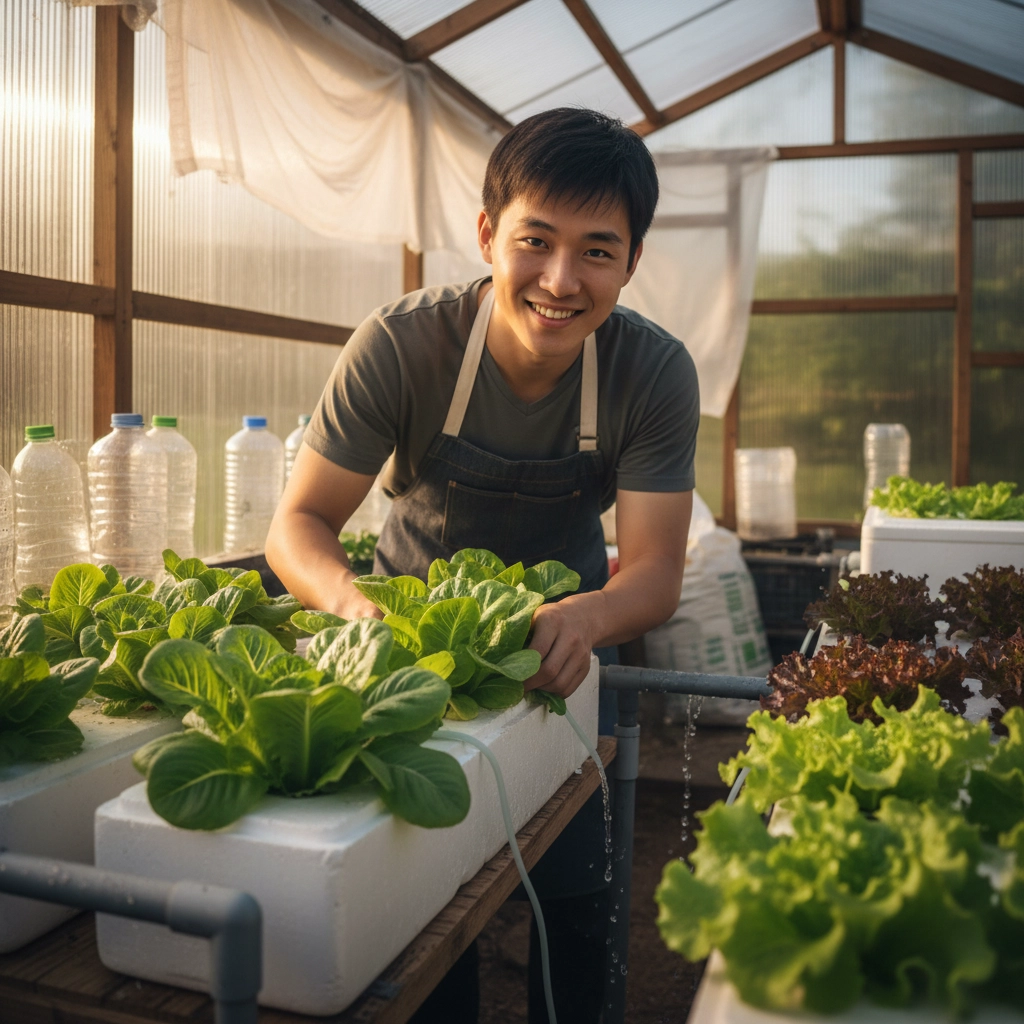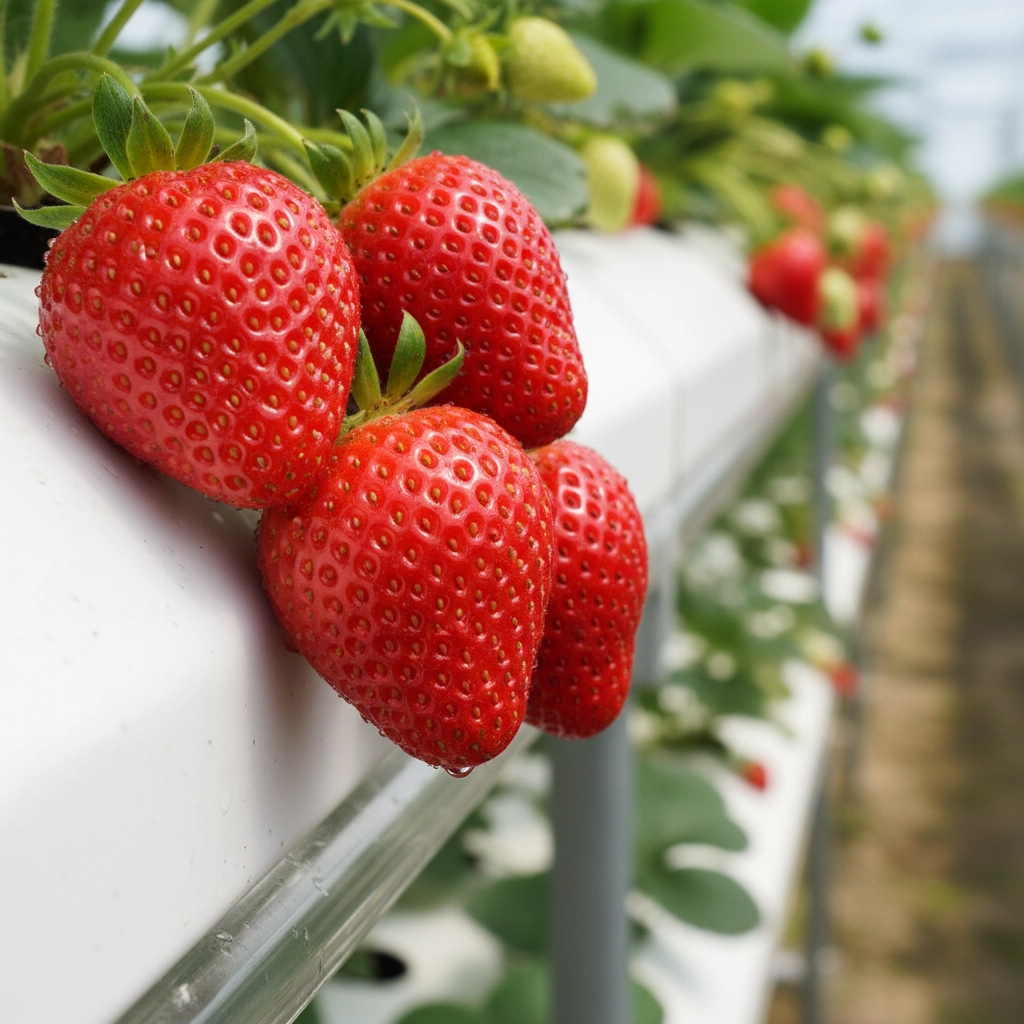Blog
Young Growers Are Crushing It With Hydroponic Systems: 7 Success Stories That Will Inspire Your Next Setup
The hydroponic revolution isn't being led by seasoned agricultural veterans: it's being driven by young, innovative growers who are proving that age is no barrier to farming success. From teenagers building sustainable operations in their backyards to college students turning small investments into thriving businesses, these young entrepreneurs are redefining what it means to be a modern farmer.
Their stories aren't just inspiring: they're packed with practical lessons that can guide your own hydroponic journey. Let's dive into seven remarkable success stories that demonstrate the real potential of hydroponic growing systems.
Story 1: Harold Zapata - From P1,000 to P15,000 Monthly Income
Harold Zapata's story begins like many during the pandemic: stuck at home with time on his hands and a desire to do something productive. This 21-year-old marketing student from San Fernando, Pampanga, started his hydroponic venture with just P1,000 (about $18 USD) in capital.
His approach was methodical and resourceful. Harold spent weeks watching YouTube tutorials and joining Facebook groups dedicated to hydroponics business advice. Instead of investing in expensive equipment, he constructed a makeshift greenhouse using wood, bamboo, and plastic screens. His first crop? Eighty heads of lettuce varieties, specifically targeting the growing demand from local samgyupsal (Korean barbecue) restaurants.
The key to Harold's success was his creative use of materials. He repurposed styrofoam grape boxes as starter kits and invested in basic supplies: styrofoam cups, coco peat, seeds, and nutrients. Today, Harold operates a 50 square meter greenhouse with 500 crops and earns approximately P15,000 monthly from crop sales. The Department of Agriculture has even partnered with him through their Kadiwa program, providing a steady customer base.
Harold's Success Factors:
- Started small with minimal investment
- Focused on a specific market niche (Korean restaurants)
- Used recycled and affordable materials
- Built partnerships with government programs

Story 2: Hanna Joe - Building Community Through Hydroponics at 17
At just 17 years old, Hanna Joe represents the next generation of socially conscious growers. She didn't just build a sustainable hydroponic farm at home: she extended her impact throughout her community.
What sets Hanna apart is her commitment to sharing knowledge and resources. She regularly donates hydroponic kits to children's homes and teaches her peers about sustainable farming methods. This approach has created a multiplier effect, spreading agricultural knowledge and food security awareness far beyond her personal operation.
Hanna's model demonstrates that hydroponic farming can be about more than profit: it can be a tool for community empowerment and education. Her work shows how young growers can build sustainable businesses while making a positive social impact.
Story 3: Dheeraj Verma - Strawberry Success in Two Months
Dheeraj Verma's transformation from frustrated traditional farmer to hydroponic success story happened after watching a television program about Israel's innovative farming methods. Operating a 10-acre farm in Barabanki, he was struggling with local sales challenges using conventional crops.
His solution was bold: invest Rs 12 lakh (about $14,400 USD) to establish a 3,500 square foot hydroponics system specifically for strawberry cultivation. The results were dramatic. Within just two months of his first harvest, Dheeraj harvested five tonnes of strawberries and earned Rs 3 lakh in sales.
This represented a fivefold increase in production efficiency compared to his traditional farming methods. Dheeraj's story illustrates the dramatic yield potential of hydroponic systems when properly implemented and managed.
Dheeraj's Key Lessons:
- Research international farming innovations
- Focus on high-value crops like strawberries
- Invest in proper system sizing for your goals
- Track production efficiency metrics
Story 4: Sandeep Kannan - From Terrace Experiments to Rs 54,000 Monthly
Sandeep Kannan's journey began during the COVID-19 lockdown with a simple desire to reconnect with his farming roots. Starting with small-scale experiments on his terrace using PVC pipes and nutrient-rich water, he began growing leafy vegetables and lettuce.
The path wasn't smooth. Sandeep faced initial capital constraints and family skepticism about his unconventional farming approach. However, his perseverance paid off as he gradually expanded operations and gained acceptance from local supermarkets and residential areas in Tirupati.
Today, Sandeep earns Rs 54,000 monthly from his hydroponic operation. His story demonstrates that you don't need large amounts of land or capital to build a successful hydroponic business: just creativity, persistence, and willingness to start small.

Story 5: David - Community-Focused Farming at 15
David, a 15-year-old from Zambia, represents the global reach of the young farmer movement. His approach to hydroponics centers on community empowerment and addressing local food security challenges.
Rather than focusing solely on personal profit, David uses his hydroponic knowledge as a tool for giving back to his community. His work demonstrates how young people can leverage modern farming techniques to address pressing local needs while developing valuable skills and business experience.
David's story highlights the potential for hydroponic farming to create positive social impact, especially in regions where traditional agriculture faces significant challenges.
Story 6: Dexter Donn Alingay - Overcoming Adversity Through Agriculture
Dexter Donn Alingay's story from Kadingilan, Bukidnon, showcases how hydroponic farming can provide pathways out of difficult circumstances. Facing a challenging childhood and needing to self-support his studies, Dexter turned to hydroponic farming as both an income source and a path to agricultural entrepreneurship.
His journey demonstrates the accessibility of hydroponic farming for young people facing economic hardship. By building sustainable growing operations, young farmers like Dexter can create reliable income streams while pursuing education and building long-term career prospects in agriculture.
Story 7: The Collective Success of Online Communities
The seventh success story isn't about one individual: it's about the power of online communities that are nurturing thousands of young hydroponic growers worldwide. Platforms like Facebook groups, YouTube channels, and specialized forums are creating supportive environments where young farmers share knowledge, troubleshoot problems, and celebrate successes together.
These communities provide crucial resources that traditional agricultural education often lacks: real-time problem-solving, cost-effective solutions, and peer-to-peer learning opportunities. Many of the success stories above specifically mention learning from online communities as a key factor in their growth.
What Makes Young Growers Successful
Analyzing these success stories reveals several common factors that contribute to young growers' achievements:
Adaptability and Learning Agility: Young growers readily embrace new technologies and learning methods. They're comfortable learning from YouTube videos, online forums, and social media groups: resources that provide immediate, practical advice.
Creative Resource Management: Limited budgets force creative solutions. Many successful young growers excel at repurposing materials, finding affordable alternatives, and maximizing small investments through careful planning.
Market Focus: Successful young growers often identify specific market niches early. Whether it's supplying restaurants, focusing on premium crops, or serving local communities, they understand their customer base and grow accordingly.
Technology Integration: Young farmers naturally integrate technology into their operations, from automated nutrient delivery systems to social media marketing for their products.

Getting Started: Lessons from the Success Stories
If these stories have inspired you to start your own hydroponic journey, here are the key takeaways:
Start Small and Scale Gradually: Every success story began with modest investments and small-scale experiments. Harold started with P1,000, Sandeep began on his terrace, and Hanna built her first system at home.
Focus on Learning: Invest time in education before investing money in equipment. Join online communities, watch tutorials, and connect with experienced growers.
Choose Your First Crop Strategically: Consider factors like market demand, growing difficulty, and profit margins. Leafy greens like lettuce and herbs are excellent starting points due to their fast growth cycles and steady demand.
Plan Your Market: Before you plant, know where you'll sell. Local restaurants, farmers markets, and direct-to-consumer sales are common starting points for young growers.
Use Quality Growing Materials: While creativity and cost-savings are important, don't compromise on essential growing components. Proper containers and propagation materials form the foundation of successful hydroponic systems.
Building Your Support Network
One factor that emerges from every success story is the importance of community and learning networks. Whether it's Harold's Facebook groups, Hanna's peer teaching, or David's community focus, successful young growers don't operate in isolation.
Consider joining local gardening groups, online hydroponic communities, and educational programs. Many agricultural extensions and community colleges offer courses specifically designed for young farmers and urban agriculture enthusiasts.
The Future of Young Growers
These seven success stories represent just the beginning of a larger trend. Young growers are not only succeeding with hydroponic systems: they're innovating new approaches, developing sustainable practices, and building businesses that address both personal economic needs and broader community challenges.
Their success demonstrates that hydroponic farming offers accessible entry points into agriculture for people without traditional farming backgrounds, large amounts of capital, or extensive land holdings. As these systems become more refined and educational resources continue to expand online, we can expect to see even more young entrepreneurs finding success through hydroponic growing.
The combination of low startup costs, fast crop cycles, high yields, and strong online learning communities creates an ideal environment for young, motivated growers to build successful agricultural enterprises. Whether you're looking to start a side business, contribute to your community, or launch a full-scale agricultural career, these success stories prove that age is no barrier to hydroponic farming success.
Ready to start your own hydroponic journey? Explore our complete selection of growing systems and supplies to begin building your success story today.
